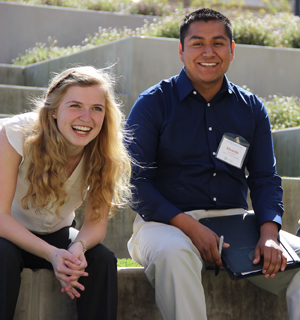Engineering Student Named University Innovation Fellow by NSF-Funded Epicenter

Abbey Buckenheimer ’16 ME outside the offices of the Stanford Technology Ventures Program, which UI Fellows visited during an interactive campus exploration of Stanford's innovation and entrepreneurship resources. Photo credit: Ben Colman for Epicenter
Villanova University Engineering student Abbey Buckenheimer ’16 ME is one of 66 students across the country to be named University Innovation Fellows by the National Center for Engineering Pathways to Innovation (Epicenter). The University Innovation Fellows (UI Fellows) are a network of student leaders working to create lasting institutional change that will increase student engagement with entrepreneurship, innovation, creativity, design thinking and venture creation. Abbey’s recognition as a UI Fellow is yet another testament to Villanova’s increasing campus-wide emphasis on entrepreneurial thinking.
A Mechanical Engineering major with a Dynamic Systems concentration, and a dual minor in Engineering Entrepreneurship and Mechatronics, Abbey was nominated and sponsored for the Fellows network by Edmond Dougherty ’69 EE, ’86 MSCS, director of the Engineering Entrepreneurship program. He explains how Abbey demonstrates the qualities that Epicenter looks for, “In addition to being a creative and innovative individual, Abbey also is a strategic thinker who possesses the perseverance and enthusiasm to work toward a campus-wide goal of instilling in fellow students an entrepreneurial mindset.” He adds, “To ignite change, we must recognize, encourage and further develop the creative thinkers and dreamers among us.”
In defining her priorities as a UI Fellow, Abbey first identifies what she considers to be the most paramount issue for Villanova when it comes to innovation and entrepreneurship. “It’s a reputation problem,” she says. “As a school that in many ways encourages the traditional path of education, graduate schooling and entry into the corporate world, many students do not seem to relate to the seemingly eccentric façade that often covers the world of innovation,” she explains. In an effort to change that mindset, Abbey recommends the creation of a student-run Innovation Council that would operate in conjunction with the Villanova Entrepreneurial Society. She says, “The council can help publicize under-appreciated events and opportunities at Villanova, as well as create their own.” In addition, Abbey suggests developing a comprehensive campus-wide Entrepreneurship Minor program, and establishing a space on campus—The Idea Accelerator—in which students of all disciplines will be able to collaborate.
University Innovation Fellows are part of an extraordinary national network of students—110 Fellows at 78 U.S. universities—who are trained to survey the landscape of courses, programs, curricular and extra-curricular assets in their school’s entrepreneurial ecosystem to identify what gaps need to be addressed in order to facilitate more invention and innovation activity amongst their engineering, science and interdisciplinary peers. Fellows are sponsored by faculty and administrators at their university, and selected through an application process each spring and fall.
Following acceptance into the program, students complete six weeks of online training, after which they gather for in-person events. Current Fellows and Fellow Candidates in training gathered in Silicon Valley March 20-22, 2014 and took part in workshops and activities at Google, Stanford University and the National Collegiate Inventors and Innovators Alliance’s (NCIIA) Open 2014 Conference. The NCIIA and National Science Foundation provide funding for the UI Fellows program, which is part of a national movement to help all students gain the attitudes, skills and knowledge required for them to compete in the economy of the futite.
